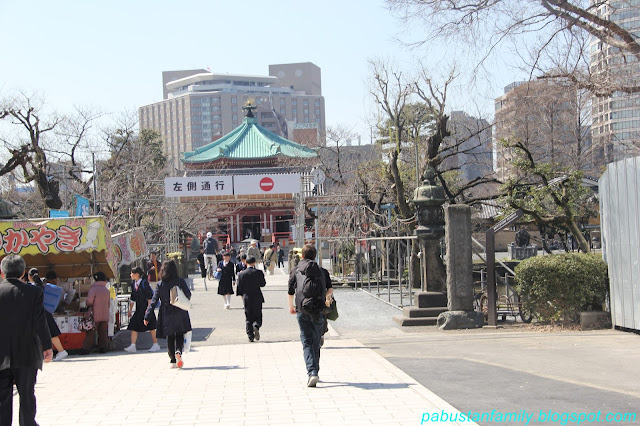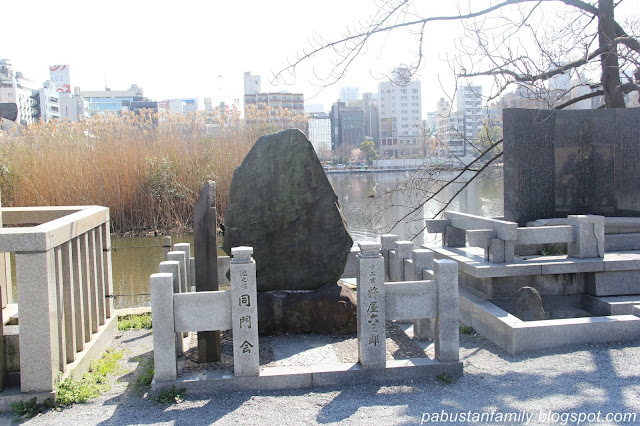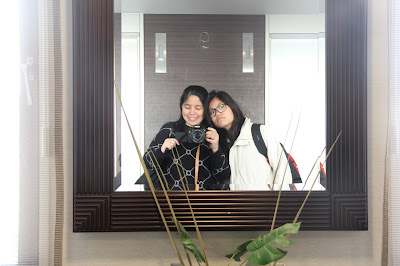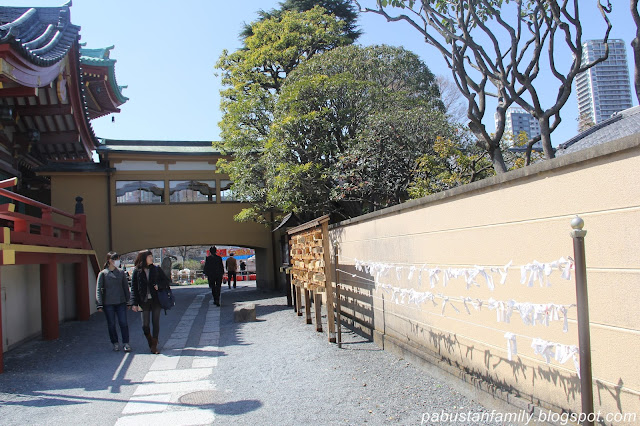Ueno Park
Sensoji-Temple
Tokyo Skytree
 |
| Ueno Park |
 |
| Senso-ji Temple |
 |
| Tokyo Skytree |
We have a separate post detailing our metro transfers from one place to another place where we always had missed our train stops... stops... not just once. And all the troubles we had gone through-managed to get to the boarding area, 15 minutes before the closure. Please click the link, Last day in Tokyo
checked out at 10am and left our luggage at the hotel's storage.


alighted at Ameyoko and early lunch at Tendon Tempura Tenya
 |
| Early cherry blossoms at Ueno Park |
Ueno Park is the most visited park in Japan located in the Ueno district of Taito, Tokyo, with over 10 million visitors a year. The park is at its busiest in Spring for its cherry blossoms and hanami. Among the 8,800 trees in the park are the over 800 Sakura (cherry trees) that bloom in spring. The park is also filled with museums, temples, shrines, natural attractions and Japan's top schools and important institutions to name a few:
1. Tokyo National Museum
2. Ueno Zoo with the Pagoda inside
3. Hanami- best spot to see the cherry blossoms trees
4. Kiyomizu Temple
5. Bentendo
6. Shinobazu Pond
7. Toshogu Shrine
8. Tokyo University
9. Ueno Daibutsu...
1. Tokyo National Museum
2. Ueno Zoo with the Pagoda inside
3. Hanami- best spot to see the cherry blossoms trees
4. Kiyomizu Temple
5. Bentendo
6. Shinobazu Pond
7. Toshogu Shrine
8. Tokyo University
9. Ueno Daibutsu...
Ueno Park was originally part of the Kaneiji Temple. Latter used to be one of the city's largest and wealthiest temples during the Edo period (1603~1868). It was built north-east of the Edo castle (at present, the Imperial Palace) by the Tokugawa shoguns (soldiers) to guard the castle/ protect from evil spirits. Edo Period was the period when the Japanese were ruled by the Tokugawa clan under the Feudal or Military Government
Edo period ended in May 1868 with the restoration of Meiji Imperial.
In the Ueno Battle during the Boshin war in July 1868, about 2,000 strong and loyal shoguns barricaded Kaneiji Temple with the intention to resist. From there, the shoguns were harassing the imperial troops forcing the imperial side to attack the Kaneiji Temple, outnumbered though. The attack was initiated by alliance of Satsuma and Choshu followed by the Tosa troops who used the Armstrong cannons and Snider guns. The shogunates were defeated, thousands of houses were burnt and almost all the temples were destroyed. There were over 30 buildings before the Boshin War.
Edo period ended in May 1868 with the restoration of Meiji Imperial.
In the Ueno Battle during the Boshin war in July 1868, about 2,000 strong and loyal shoguns barricaded Kaneiji Temple with the intention to resist. From there, the shoguns were harassing the imperial troops forcing the imperial side to attack the Kaneiji Temple, outnumbered though. The attack was initiated by alliance of Satsuma and Choshu followed by the Tosa troops who used the Armstrong cannons and Snider guns. The shogunates were defeated, thousands of houses were burnt and almost all the temples were destroyed. There were over 30 buildings before the Boshin War.
We managed to visit two of the surviving temples during our 2016 Japan trip:
1. Kiyomizu Kannondo and
2. Bentendo
1. Kiyomizu Kannondo and
2. Bentendo
 |
| Kiyomizu Kannondo Temple |
One of the surviving temple building after the Ueno Battle in 1868 is the Kiyomizu Kannondo (or Simizudo) of 1631, It is one of the oldest structures in Tokyo and still in its same old position.
Kiyomizu Kannon-do Temple is the Temple of Pure Water. Mizu means water and kiyo means clear or pure. The temple is the miniature of the famous Kiyomizu dera temple in Kyoto (628AD)
 |
| Kiyomizu Kannondo |
Women who have difficulty conceiving make homeage to the goddess. Those who had their wish fulfilled comes back and donate a doll. The dolls are accumulated and ritually burn in an annual ceremony, every 25 of September.
 |
| Chozuya at Kiyomizu Kannondo , Ueno Park, Tokyo |
At every temple, there's always a fountain located on the right side. It is in custom to use the provided small ladle to take water to wash our hands and mouth before going inside the temple
Besides the Chozuya is the EMA, a small wooden plaques. When visiting temples or shrines, you can pray by writing your wish on EMA and hang it back on the rack. It is believed the wishes are received by the the Kami (spirits or gods). In the ancient times, horses were being offered as they thought the gods rode horses.
Auspicious rock near the temple.
We did not pull Omikuji fortune at this temple. Should you do and the fortune is not good, tie it up on this rack to get rid off the bad luck.
 |
| Chozuya at Kiyomizu Kannondo , Ueno Park, Tokyo |
 |
| Tomb of Shogitai Warriors |
These two tombstones were erected for the Shogi-tai soldiers killed here. The small tomb stone in the front was errected by a priest of Kan-eiji temple in 1869 and the large stone in the back by a survivor, a soldier called Ogawa Okisato and several of his comrades.
These tombstones were registered as important cultural assets in 1990 in the Book of Cultural Assets of Taito City.
***as per written on the information display |
| Saigo Takamori statue located near the Southern entrance of Ueno Park |
 |
| Chozuya at Kiyomizu Kannondo , Ueno Park, Tokyo |
 |
| Chozuya at Kiyomizu Kannondo , Ueno Park, Tokyo |
 |
| Bentendo, Ueno Park, Tokyo, Japan |
There are many Bentendo temples all over Japan The goddess was originally the personification of a river. Bentendo temple are mostly erected next to some source of water such as river, pond, spring or even the sea.
 |
| Small Holy Place around Benten-do Temple |
 |
| Monument in Memory of Fugu |
 |
| Monument of Rokusaburo Kineya |
 |
| Monument of Kengyo Yatsuhashi |
 |
| Monument of Fan and Ksitigarbha |
 |
| Benten-do Temple, Ueno, Taito, Tokyo, Japan |
 |
| Kouro at Benten-do Temple |
Kouro at the entrance of Bentendo temple. For 100Yen, take an incense and light it up to refresh your body and mind before getting inside the temple.
 |
| EMA at Benten-do Temple, Ueno, Taito, Tokyo, Japan |

 |
| Shinobazu Pond and the Bentendo Temple |
 |
| Cormorant Pond |
 |
| Cormorant Pond |
Shinobazu Pond is a small lake within Ueno Park. Wintering ground for many birds amongst are Tufted duck, Pochard, Pintail, Wigeon, Mallard, Night Heron, Common Gallinule, Great Egret... The pond is natural, modified many times though. In the middle of it is the temple of Bentendo.
The pond is divided into three areas:Lotus pond
Boat pond and the
Cormorant pond
 |
| Boat Pond |
 |
| Shinobazu pond (Lotus pond area) |
 |
| Shinobazu pond (Lotus pond area) |
 |
| Bentendo Temple in the Shinobazu pond (Lotus pond area) |
 |
| Bentendo Temple in the Shinobazu pond (Lotus pond area) |
 |
| Bentendo Temple in the Shinobazu pond (Lotus pond area) |
 |
| Bentendo Temple in the Shinobazu pond (Lotus pond area) |
 |
| Ueno Business district and Shinobazu pond (Lotus pond area) |
 |
| Ueno Business district |
 |
| Ueno Business district |
Cherries have started to bloom. We were 2 weeks earlier. Spring in Japan is school days in Singapore. Our youngest would experience the cherry blossom after JC or Poly school.
To continue to Senso-ji Temple
Continued from Ameyoko
Related Posts:
Tempura Tendon
Tenya |
Hakone 2016
|
Akihabara to
Tokyo Tower |
Hakone Open Air
Museum 2 |
Missed Train stops
|
More of Travels in
Japan 2016 |
Lake Yamanaka
|
Check out the places we had visited in Asia
See Also:































No comments:
Post a Comment